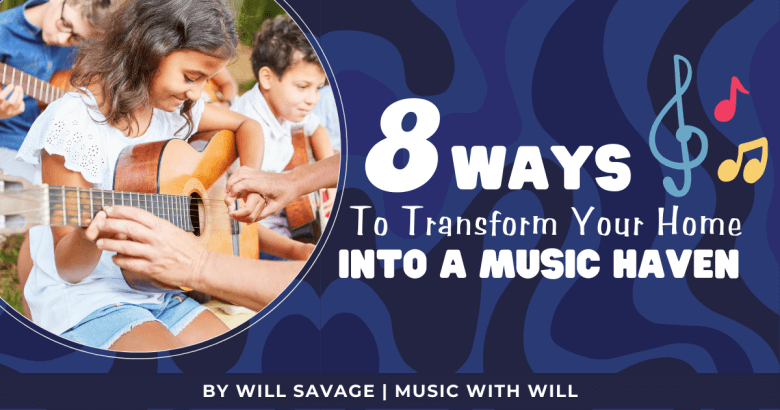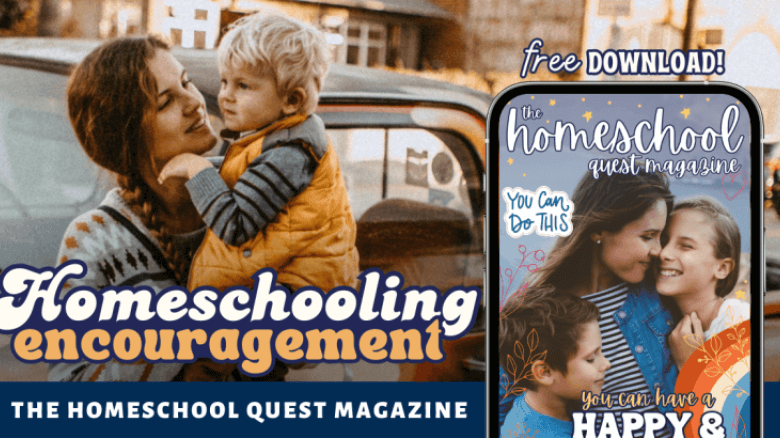By Will Savage of Music With Will
My parents always wanted my homeschooling to be well-rounded, and they knew music couldn’t be missed. The funny thing? Neither of them had a musical background. In fact, they were probably relieved when my love for music blossomed on its own. Little did anyone know, their efforts sparked a passion that led me to where I am today—teaching music and helping other homeschool kids grow in the same way.
Here’s a bold thought: Music is a Mental Power-Up. Music even helped me learn Mandarin! Rhythms hooked the vocabulary in my mind. Sharp listening skills gained from music made its pronunciation child’s play; music fuelled my language learning.
But here’s the bigger point: music helps children in all facets of learning—whether it’s general academic performance, mental health, or fostering creativity. From reducing anxiety to offering new communication methods for autistic children, the benefits of music education are vast.
So how do you bring all these benefits into your home, even if you’re not a musician? After 16 years of teaching, I’ve seen firsthand what works. Let’s dive into 8 practical tips to inspire music education at home:
1. Create a "Music Room"
I remember my parents designating such a ‘music room’, a space where sound could be explored and skills honed. (And no, despite how it sounds, I didn’t grow up in an 18th century manor house with butler and maid.)
Surround your kids with instruments—whether bought or homemade. The idea is to make music feel accessible, inviting them to explore whenever the mood strikes.
“We have given over our front room to music / the opportunity to play. We’ve slowly collected a range of instruments, both electric and acoustic (guitars, violins, ukulele, flute, tin whistles, piano, percussion etc.). It’s there as an invitation. Sometimes I catch the kids teaching each other what they have learned and occasionally working the same tune out on different instruments so they can play together - magic.” – Caroline
2. Go to a Concert!
My memories of hearing live music as a child are indelibly stored in my mind. Never underestimate the power of attending concerts, gigs, and multisensory events. These experiences deepen children’s appreciation of music and inspire them to explore new instruments and sounds.
“We saw a light projection show built around Vivaldi’s *Four Seasons*—an incredible experience.” – Iona
“We’ve taken the kids to family-friendly concerts, like open-air music events at a country house." – Sam
3. Brilliant Blunders
Don’t wait for perfection or let your children flop in fear of failure—embrace the learning process, mistakes and all. Have you considered taking up an instrument or joining a local singing group yourself? Your own learning process will normalize error and show your children that blunders are simply part of growth; persevere and they will be motivated when they see your growth that results.
“I’m not a musician, but I practice guitar where the kids can hear me being bad, and gradually they’ve heard me improve.” – Caroline
"We all laugh, make mistakes, and develop new interests, something which I feel is incredibly beneficial both in terms of education and family. It makes us more resilient, it nourishes our souls, and challenges our intellect." – Liz
4. Make Music Moments
Dance in the kitchen, have a family jam session, or make up silly songs. These shared experiences build musical and family connections. Whether during meals, car rides, or bedtime, make music part of your daily life.
"Dance parties (hooleys) in the kitchen, playing music and dancing out all the big emotions or excess energy on a wet day when we are all cooped up." –Maireen
“We listen to music during meals, and often the kids pick a song and explain why they chose it.” – Laura
5. Help Children Find Themselves Through Music
Let your child’s interests guide their musical journey. Whether it’s choosing their instrument, rewriting lyrics to familiar songs, or exploring different music styles, this freedom fosters a love for music and encourages creativity.
“We wanted our girls to have a musical upbringing but with no pressure to learn any particular instrument.” – Lizzie
“My oldest has gotten quite good at changing lyrics to match whatever we’re doing, like ‘why won’t you eat your tea’ to ‘I Want It That Way’ by the Backstreet Boys.” – Emma
6. Integrate Music Into Learning
Music networks with almost every other subject: history, geography, math or literature. Visit museums, explore composers’ stories, or combine music with creative projects. Music can spark curiosity and enrich learning across disciplines.
“The boys are currently working on a creative project together themed around making a band and taking it on a European tour - it's great fun, using their interest in music to think about geography, climate, design for merchandise, maximizing ticket sales. All sorts!” – Liz
"When we went to Salzburg, we visited Mozart’s house... seeing his violin, fortepiano and harpsichord, which was incredible!" – Eva
7. Embrace Flexibility and Collaboration
Homeschooling can be flexible—let kids explore music when they’re inspired. Whether playing with digital tools like Chrome Music Lab or Ogen+ or collaborating with musicians online, these low-pressure, creative environments let kids explore music freely.
“With home education, music can be incorporated into the boys' education organically and in a very child-led way. Home Ed means he gets to play drums and develop his talent at various points during the day. George collaborates online with musicians from around the world.” – Liz
"There are plenty of digital tools that make music accessible. Platforms like Chrome Music Lab let kids explore music in a low-pressure environment." – Iona
8. Encourage Performances and Low-Pressure Jam Sessions
Create informal performance opportunities, whether family gatherings, jam sessions with friends or backyard concerts. These low-pressure settings help reduce performance anxiety while nurturing a love for music.
“We had our own summer festival in the garden with drums, guitars, and keyboards. The kids played together and supported one another.” – Caroline
"I recently organized a samba drums workshop at home in our garden for a group of home-educated families." – Liz
Read More!
- Log in to post comments


